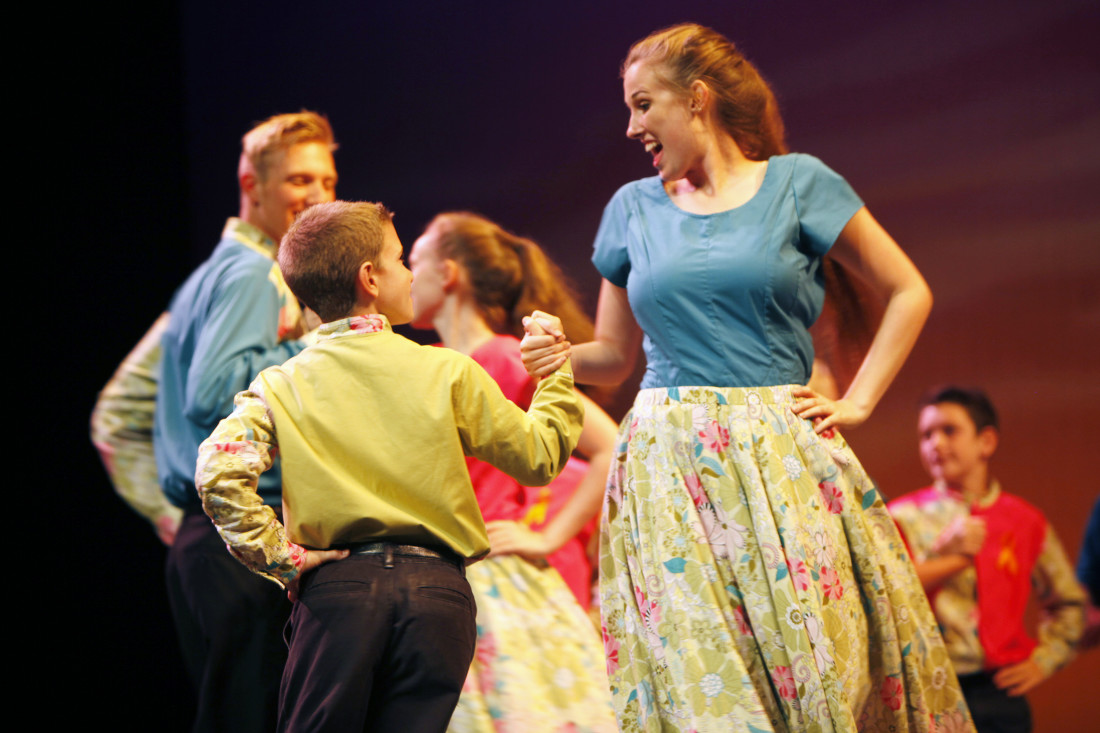Every night of the Mountain Dance and Folk Festival starts out the same way. Before the fiddlers and banjo players rip their way through old-time favorites, before the clogging teams stomp out their precision circles and figures, Ed Herron gets on the stage. He’s there to tell the story of his grandfather — the founder of the nation’s oldest continually running folk festival — Bascom Lamar Lunsford.
“Sometimes people get tired of hearing the story, but it’s our way of giving the man respect for what he did for our mountains,” says Loretta Freeman, chair of the Asheville-based Folk Heritage Committee, which organizes the annual event. It’s been more than four decades since Lunsford’s passing, but the Mars Hill folklorist known as the Minstrel of the Appalachians remains a towering presence in the region’s mountain music community. The 90th iteration of the Mountain Dance and Folk Festival, taking place at the Mission Health/A-B Tech Conference Center from Thursday, Aug. 3, through Saturday, Aug. 5, places Lunsford’s legacy front and center.
Lunsford first organized the event as part of Asheville’s 1927 Rhododendron Festival. Tasked by the Asheville Area Chamber of Commerce to round up local musicians and dancers as a tourist draw, he invited many of the performers he’d met during his travels collecting folk songs throughout the region. Ever since then, the festival has continued to tap the area’s deep-rooted heritage. “The longevity of this festival comes from the wonderful ancestry that has evolved out of the mountains,” says Freeman. “You’ll have up to five generations in a family that are still playing music.”
Freeman speaks of Lunsford on a first-name basis when outlining the plans for this year’s festival. “In the lobby, we’ll have some photography of Bascom’s home on Turkey Creek, and we’re going to tell some stories about the floor in that home — it was built so you could have a clogging team in the living room,” she says. Freeman is also organizing a group of cloggers to replicate one of the traditional dance sets performed at Turkey Creek, complete with costumes appropriate for the era.
Some aspects of the festival, Freeman admits, have changed since Lunsford’s inaugural gathering. The format has shifted from a competition among artists to a celebration of their shared heritage, the venue has moved from outdoors at Pack Square to less weather-dependent surroundings, and the scheduling has become much less stomach-churning for the performers. “Bascom used to just come over to you backstage in his white suit and ask, ‘Are you ready to play?’” she says with a laugh.
The modern lineup is more structured, which helps the Mountain Dance and Folk Festival fit in more than 40 acts over its three nights. This year’s schedule places special emphasis on award-winning artists from throughout the Southern Appalachians. Grammy winners on the bill include multi-instrumentalist David Holt, bluegrass fiddler Bobby Hicks and flat-picker Bryan Sutton. Other highlights include banjo player Laura Boosinger and flatfoot dancer Phil Jamison, both Blue Ridge Music Hall of Fame inductees, and Brown-Hudson Folklore Award-winner Roger Howell.
The festival will also be giving out its own awards, but not to individual performers. Instead, as Folk Heritage Committee member Carol Peterson explains, each night will honor a different college or university that has contributed to the preservation of traditional mountain artistry. “The biggest challenge to preserving Appalachian culture today is making sure that our younger generation is exposed to and taught this traditional music and dance,” Peterson says. “We’re presenting awards to Mars Hill University for [its] national award–winning Bailey Mountain Cloggers, to Warren Wilson College for [its] annual Swannanoa Gathering and to East Tennessee State University for [its] degree program in traditional mountain music.”
Both Freeman and Peterson believe that fidelity to tradition is key in passing on culture to the next generation of artists. “Traditional mountain music comes from a completely different era than today’s world, but it portrays something that’s down deep within. It’s phenomenal how young people are picking that up,” says Freeman.
Peterson adds, “Our goal is not to change the event to appeal to modern audiences, but to preserve our Appalachian culture.”
As Lunsford intended, the Mountain Dance and Folk Festival continues to serve as a gathering place for traditional artists young and old. It’s a public celebration of the region’s truly local culture, drawing lifelong residents and tourists alike. “Every year, the festival is like a coming-home reunion,” says Freeman. “It’s a dressed-up showcase — as Bascom would always say, ‘Put on your Sunday best.’ But as long as it’s clean, it doesn’t matter if you’re in overalls.”
WHAT: 90th annual Mountain Dance and Folk Festival, folkheritage.org/75thannua.htm
WHERE: Mission Health/A-B Tech Conference Center, 16 Fernihurst Drive
WHEN: Thursday, Aug. 3, to Saturday, Aug. 5, 6:30 p.m. $22 general admission/$15 student/$12 children (12 and younger)/$60 three-night pass




A great Asheville and WNC tradition!